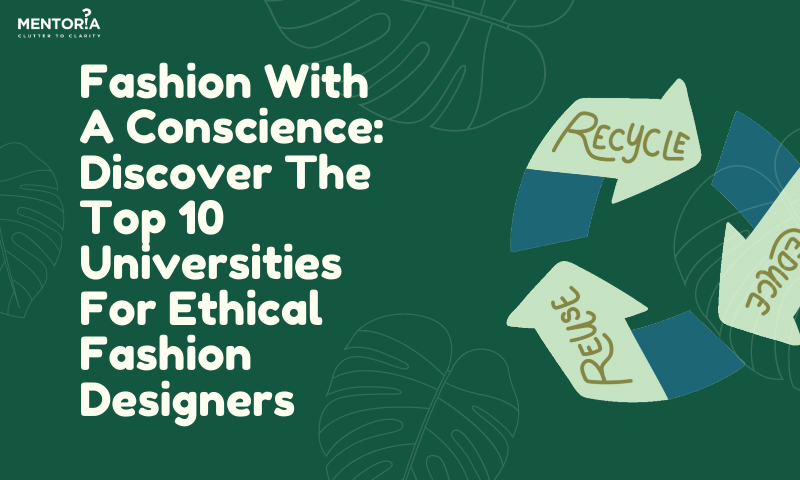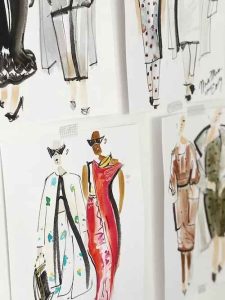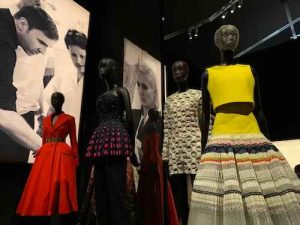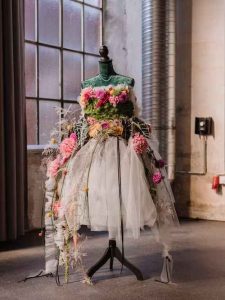Fashion With A Conscience: Discover The Top 10 Universities For Ethical Fashion Designers

Jump to Section
Hey there, fashion enthusiasts! Are you passionate about creating trendy designs while also making a positive impact on the world? If so, you’re in for a treat! In this blog, we’ll take you on a whirlwind journey through the top 10 universities and institutions offering courses for ethical fashion designers in India and abroad. Get ready to explore innovative programs, learn about tuition costs, and discover how you can turn your passion for fashion into a force for good.
Institutions Offering Courses For Ethical Fashion Designers
National Institute Of Fashion Technology (NIFT), India
NIFT, the leading fashion institute in India, offers a diverse range of courses for aspiring ethical fashion designers. Through its comprehensive curriculum, you’ll learn about sustainable materials, responsible production processes, and innovative design techniques. The institute encourages creativity and ethical consciousness, nurturing students to become future leaders in the industry. The tuition fees for undergraduate programs at NIFT range from INR 1,00,000 to INR 2,50,000 per year, making it an accessible choice for those passionate about ethical fashion.
- Ranking and Accreditation: NIFT is highly ranked among fashion institutes in India and is accredited by the Ministry of Textiles, Government of India.
- Intake: NIFT conducts an entrance exam called the NIFT Entrance Exam, which determines the intake of students.
- Challenges: Students may face challenges in maintaining a balance between creativity and sustainability, keeping up with industry trends, and meeting high academic standards.
- Benefits: NIFT offers exposure to industry experts, internships, industry collaborations, and a strong alumni network.
- Course: NIFT offers a course in Fashion Design with a specialisation in Ethical Fashion Design.
London College Of Fashion, United Kingdom
The London College of Fashion is a hub for creativity and innovation, known for its cutting-edge programs in ethical fashion design. With a strong emphasis on sustainability, the college offers courses that integrate social responsibility with contemporary design concepts. Immerse yourself in the vibrant fashion scene of London and learn from industry experts. Tuition fees vary depending on the course, ranging from INR 7,00,000 to INR 16,00,000 per year, offering a valuable investment in your future career as an ethical fashion designer.
- Ranking and Accreditation: London College of Fashion is highly regarded globally and is part of the University of the Arts London.
- Intake: The college has competitive admission, and the intake varies each year.
- Challenges: Students may face challenges in adapting to a fast-paced and competitive environment, staying updated with fashion trends, and managing a demanding workload.
- Benefits: Students benefit from the college’s industry connections, collaborations, access to fashion events, and the multicultural learning environment.
- Course: London College of Fashion offers a course in BA (Hons) Fashion Design Technology with Sustainability.
Fashion Institute Of Technology (FIT), United States
Located in the heart of New York City, the Fashion Institute of Technology (FIT) is renowned for its commitment to sustainability and ethical fashion. Through its diverse range of programs, FIT provides students with the skills and knowledge to navigate the ever-evolving fashion industry while incorporating responsible practices. International students can expect tuition fees ranging from INR 13,00,000 to INR 20,00,000 per year, reflecting the exceptional education and resources available at this prestigious institution.
- Ranking and Accreditation: FIT is highly regarded in the field of fashion and is accredited by the Middle States Commission on Higher Education.
- Intake: FIT has a competitive admission process, and the intake varies each year.
- Challenges: Students may face challenges in keeping up with rapidly changing fashion trends, meeting rigorous academic standards, and developing a unique design perspective.
- Benefits: FIT offers industry-focused curriculum, internships, access to cutting-edge facilities and resources, and networking opportunities in the heart of New York City.
- Course: FIT offers a course in Fashion Design with a focus on Sustainable Fashion.
Royal Academy Of Fine Arts, Belgium
The Royal Academy of Fine Arts in Belgium offers an inspiring environment for ethical fashion designers, emphasising avant-garde and sustainable fashion. Through its programs, students have the opportunity to explore unconventional design approaches while incorporating ethical principles. The tuition fees for international students are around INR 12,00,000 per year, providing access to a rich cultural and educational experience.
- Ranking and Accreditation: The Royal Academy of Fine Arts is well-known for its fashion programs and is accredited by the Dutch-language Accreditation Organization of the Netherlands and Flanders (NVAO).
- Intake: The academy has limited seats available, and admission is competitive.
- Challenges: Students may face challenges in balancing creativity with ethical practices, exploring innovative design concepts, and meeting the high expectations of the fashion industry.
- Benefits: Students at the Royal Academy of Fine Arts benefit from a rich artistic heritage, access to renowned faculty, collaborations with industry professionals, and exposure to international fashion events.
- Course: The academy offers a course in Fashion Design with a specialisation in Sustainable Fashion.
Istituto Marangoni, Italy
At Istituto Marangoni, located in the fashion capital of Milan, students can immerse themselves in the essence of Italian fashion and sustainability. The institute’s programs foster creativity and innovation while instilling a strong commitment to ethical practices. With tuition fees ranging from INR 10,00,000 to INR 16,00,000 per year, students receive top-notch education and exposure to the world of ethical fashion design.
- Ranking and Accreditation: Istituto Marangoni is a prestigious fashion school and is recognized globally for its excellence in fashion education.
- Intake: The institute has limited seats available, and admission is based on a rigorous selection process.
- Challenges: Students may face challenges in adapting to a competitive fashion environment, keeping up with evolving industry trends, and meeting high academic standards.
- Benefits: Istituto Marangoni offers industry connections, international exposure, collaborations with luxury brands, and a vibrant learning environment in the fashion capital of Milan.
- Course: Istituto Marangoni offers a course in Fashion Design with a focus on Sustainable Fashion.
Parsons School Of Design, United States
Parsons School of Design, located in New York City, is renowned for its progressive approach to fashion education. The school offers various programs for ethical fashion designers, providing opportunities to explore sustainability, responsible production, and conscious design. As an international student, you can expect tuition fees of approximately INR 23,00,000 per year. The investment in a Parsons education prepares you for a successful career in the ethical fashion industry.
- Ranking and Accreditation: Parsons School of Design is highly regarded and is accredited by the Middle States Commission on Higher Education.
- Intake: The school has a competitive admissions process, and the intake varies each year.
- Challenges: Students may face challenges in expressing their unique design perspective, managing demanding coursework, and staying updated with industry trends.
- Benefits: Parsons offers a renowned faculty, state-of-the-art facilities, access to internships and industry connections, and exposure to New York City’s vibrant fashion scene.
- Course: Parsons offers a course in Fashion Design with a focus on Sustainable Fashion.
Central Saint Martins, United Kingdom
Central Saint Martins, part of the University of the Arts London, is known for its avant-garde and boundary-pushing approach to fashion education. The college offers programs that encourage ethical practices and innovative design solutions. With a vibrant and diverse student community, Central Saint Martins provides a stimulating environment for aspiring ethical fashion designers. Tuition fees for international students range from INR 13,00,000 to INR 18,00,000 per year, reflecting the exceptional education and resources available.
- Ranking and Accreditation: Central Saint Martins is highly ranked globally and is part of the University of the Arts London, which is accredited by the British Accreditation Council.
- Intake: The university has a competitive admission process, and the number of students admitted varies each year.
- Challenges: Students may face challenges in pushing creative boundaries, meeting rigorous academic standards, and establishing their unique design identity.
- Benefits: Central Saint Martins offers access to renowned faculty, cutting-edge facilities, collaborations with industry professionals, and exposure to London’s fashion and art scene.
- Course: Central Saint Martins offers a course in Fashion Design and Sustainability.
Antwerp Fashion Academy, Belgium
The Antwerp Fashion Academy is internationally recognized for its contributions to the fashion industry. The academy fosters creativity, individuality, and sustainable design practices among its students. Through a multidisciplinary approach, students are encouraged to explore unique perspectives and challenge conventional norms. Tuition fees for international students are approximately INR 12,00,000 per year, providing access to world-class education in ethical fashion design.
- Ranking and Accreditation: The Antwerp Fashion Academy is known for its innovative approach to fashion education and is accredited by the Dutch-language Accreditation Organization of the Netherlands and Flanders (NVAO).
- Intake: The academy has limited seats available, and admission is highly competitive.
- Challenges: Students may face challenges in embracing avant-garde design concepts, meeting high academic standards, and establishing their place in the fashion industry.
- Benefits: The Antwerp Fashion Academy offers a unique learning environment, collaborations with industry professionals, access to fashion events, and exposure to international design perspectives.
- Course: The academy offers a course in Fashion Design with a focus on Sustainable Fashion.
Esmod International, France
Esmod International, located in Paris, offers a range of programs dedicated to ethical fashion design. The school combines traditional craftsmanship with modern approaches, preparing students for a career in the ever-evolving fashion industry. With its rich heritage and focus on sustainability, Esmod International provides a unique learning experience. Tuition fees for international students range from INR 7,00,000 to INR 12,00,000 per year, depending on the program.
- Ranking and Accreditation: Esmod International is a renowned fashion school with multiple campuses worldwide. It is accredited by the French Ministry of Higher Education and recognized for its excellence in fashion education.
- Intake: The school admits a limited number of students each year, and admission is competitive.
- Challenges: Students may face challenges in adapting to the rigorous curriculum, balancing creative expression with technical skills, and keeping up with the fast-paced fashion industry.
- Benefits: Esmod International offers experienced faculty, industry collaborations, international exposure through fashion events and internships, and a comprehensive understanding of fashion design.
- Course: Esmod International offers a course in Fashion Design and Creation with a focus on Ethical Fashion.
DSK Supinfocom, India
DSK Supinfocom, based in Pune, India, offers courses in fashion design with a focus on ethical practices. The institute emphasises the importance of sustainable design, encouraging students to create fashion with a conscience. With affordable tuition fees ranging from INR 1,50,000 to INR 3,00,000 per year, DSK Supinfocom provides an accessible option for aspiring ethical fashion designers in India. Consider your interests, career goals, and budget while exploring the programs offered by this esteemed institution.
- Ranking and Accreditation: DSK Supinfocom is a leading design school in India, recognized for its quality education and infrastructure. It is accredited by the National Board of Accreditation (NBA) and affiliated with Savitribai Phule Pune University.
- Intake: The school admits a limited number of students each year, and admission is based on a competitive entrance exam and interview process.
- Challenges: Students may face challenges in developing a strong foundation in design principles, balancing technical skills with creativity, and staying updated with evolving industry trends.
- Benefits: DSK Supinfocom offers industry-experienced faculty, state-of-the-art facilities, industry collaborations, and exposure to international design practices.
- Course: DSK Supinfocom offers a course in Fashion Design with a focus on Sustainable and Ethical Fashion.
Future Scope Of Ethical Fashion Designer Field
Job Opportunities
- Ethical fashion designers can find employment in various sectors, including fashion houses, sustainable brands, NGOs, and social enterprises.
- They can work as fashion designers, product developers, textile researchers, sustainable sourcing specialists, or consultants for brands seeking to adopt ethical practices.
- Opportunities exist in both established fashion companies and emerging sustainable fashion startups.
Entrepreneurship
- Many ethical fashion designers choose to start their own brands and establish their unique vision of sustainable fashion.
- With the growing demand for ethical and sustainable fashion, entrepreneurship allows designers to create their own niche in the industry and make a positive impact.
- Starting a sustainable fashion brand requires strong business acumen, a deep understanding of ethical practices, and the ability to connect with conscious consumers.
Specialisation And Innovation
- Ethical fashion designers can specialise in various areas, such as sustainable materials sourcing, upcycling and recycling, zero-waste pattern cutting, and ethical manufacturing.
- By focusing on a specific aspect of sustainability, designers can position themselves as experts in their chosen field and contribute to the advancement of ethical fashion practices.
- Innovations in sustainable technologies, such as fabric dyeing methods using natural and non-toxic dyes or the development of eco-friendly materials, provide opportunities for ethical fashion designers to drive positive change.
International Opportunities
- The ethical fashion movement is gaining momentum globally, offering international opportunities for designers.
- Designers can collaborate with artisans and communities in developing countries to promote fair trade and preserve traditional craftsmanship.
- International brands and organisations often seek ethical fashion designers with a global perspective to help drive sustainability initiatives across borders.
The Scope And Growth Statistics In Ethical Fashion Designer Field:
Growing Consumer Demand
- The demand for ethical and sustainable fashion is on the rise as consumers become more conscious of their purchasing choices.
- According to a report by McKinsey & Company, the market for sustainable fashion is expected to grow by 15-20% annually, reaching up to INR 6,00,000 crores globally by 2025.
Sustainability Initiatives By Fashion Brands
- Many fashion brands are embracing sustainability as part of their core values and are actively seeking ethical fashion designers to drive their initiatives.
- As more brands adopt ethical practices, the need for skilled designers with expertise in sustainable fashion will continue to grow.
Government And Industry Support
- Governments and industry bodies are recognizing the importance of sustainable fashion and promoting initiatives to support the growth of the ethical fashion industry.
- This includes providing funding and resources for research and development, organising sustainable fashion events, and implementing regulations to encourage sustainable practices.
Collaboration With Other Industries
- The scope of ethical fashion extends beyond the fashion industry, with collaborations and partnerships emerging in sectors such as technology, textiles, and manufacturing.
- Ethical fashion designers have opportunities to collaborate with innovators from other industries to create sustainable solutions and push the boundaries of ethical design.
Remember, the field of ethical fashion design offers a promising future with a range of career opportunities, the potential for entrepreneurship, and the chance to be at the forefront of sustainable innovation. As the industry continues to evolve, ethical fashion designers have the power to make a positive impact by combining their creative skills with a deep commitment to sustainability. So, embrace the ethical fashion revolution and pave your path toward a rewarding career in the world of conscious fashion.
Payscale At Various Levels
- Entry-level Positions: At the entry-level, ethical fashion designers can expect a salary range of INR 3,00,000 to INR 6,00,000 per year. Starting salaries may vary depending on factors such as the designer’s education, skills, and the size and location of the company.
- Mid-level Positions: As designers gain experience and expertise in the field, they can earn a salary ranging from INR 6,00,000 to INR 12,00,000 per year. Mid-level positions may include roles such as senior designers, product developers, or sustainable sourcing specialists.
- Senior-level Positions: Senior ethical fashion designers with extensive experience and a proven track record can earn salaries ranging from INR 12,00,000 to INR 20,00,000 per year. These positions may involve creative leadership, strategic decision-making, and managing design teams.
- Entrepreneurship: When starting their own ethical fashion brands, designers have the potential to earn varied incomes depending on the success of their ventures. Entrepreneurial income can be influenced by factors such as brand recognition, sales volume, and profit margins.
- Specialisation and Expertise: Ethical fashion designers who specialise in a particular aspect, such as sustainable materials sourcing or zero-waste pattern cutting, may earn higher salaries due to their niche expertise. Specialisation and expertise can open doors to consulting opportunities and higher-paying positions within the industry.
Which Countries Have Growth Perspectives?
India
India has emerged as a prominent player in the ethical fashion industry, combining traditional craftsmanship with sustainability. With a rich heritage of textiles and a growing awareness of environmental and social issues, India offers vast opportunities for ethical fashion designers. The payscale for ethical fashion designers in India is diverse, with entry-level salaries ranging from INR 3,00,000 to INR 6,00,000 per year and senior-level positions reaching up to INR 20,00,000 per year. The industry’s growth is fueled by the rising demand for sustainable and handmade products both within India and globally.
United Kingdom
The United Kingdom has a well-established market for ethical fashion, driven by conscious consumerism and sustainable practices. Ethical fashion designers in the UK are in high demand, and the industry offers competitive salaries. Depending on experience and brand reputation, salaries can range from £20,000 to £60,000 per year (approximately INR 18,00,000 to INR 54,00,000). With a strong emphasis on creativity, innovation, and sustainable design, the UK provides a nurturing environment for ethical fashion designers to thrive and make a positive impact in the industry.
United States
In the United States, there is a growing awareness of sustainability in the fashion industry, leading to increased opportunities for ethical fashion designers. The payscale for ethical fashion designers in the US varies based on factors such as location, experience, and the size of the company. Salaries typically range from $40,000 to $100,000 per year (approximately INR 29,00,000 to INR 73,00,000). With a large consumer market and a focus on responsible fashion choices, the US offers a promising landscape for ethical fashion designers to showcase their talent and contribute to a more sustainable future.
Australia
Australia is witnessing a rise in demand for ethical fashion, driven by conscious consumers and a focus on sustainable practices. Ethical fashion designers in Australia have the opportunity to work with locally sourced materials and promote ethical production methods. Salaries for ethical fashion designers in Australia range from AUD 50,000 to AUD 100,000 per year (approximately INR 27,00,000 to INR 54,00,000), depending on experience and brand association. The country’s unique blend of innovative design and commitment to sustainability makes it an attractive destination for ethical fashion designers seeking to make a difference.
Netherlands
The Netherlands has positioned itself as a hub for sustainable fashion, emphasising the principles of circular economy and innovation. Ethical fashion designers in the Netherlands have access to a vibrant ecosystem that encourages creativity and sustainable design practices. Salaries for ethical fashion designers in the Netherlands range from €30,000 to €60,000 per year (approximately INR 26,00,000 to INR 52,00,000). With a strong emphasis on craftsmanship, forward-thinking fashion initiatives, and a supportive environment, the Netherlands offers exciting prospects for ethical fashion designers to contribute to the industry’s growth and transformation.
How Is Technology And AI Impacting The Ethical Fashion Designer Field?
Sustainable Material Innovation
Technology and AI are driving sustainable material innovation in the Ethical Fashion Designer field. Advanced technologies like 3D printing, biofabrication, and nanotechnology are being utilised to develop eco-friendly fabrics made from recycled materials, organic fibres, and even lab-grown alternatives. These innovations not only reduce the industry’s reliance on conventional materials but also promote circularity and resource efficiency.
Supply Chain Transparency
Technology and AI play a crucial role in enhancing supply chain transparency in the ethical fashion industry. Blockchain technology enables secure and transparent records of every transaction, providing visibility into the sourcing, production, and distribution processes. This empowers ethical fashion designers to ensure that their products are made under fair labour conditions, with minimal environmental impact. By leveraging technology, designers can trace the journey of materials and communicate their brand’s values to consumers, fostering trust and accountability.
Virtual Design And Prototyping
Ethical fashion designers are embracing virtual design and prototyping tools powered by technology and AI. With 3D modelling and digital design software, designers can create virtual prototypes and visualise their designs before physical production. This not only saves time and resources but also allows for quick iterations and modifications. By reducing the reliance on physical samples, designers can minimise material waste and make the design process more sustainable, efficient, and cost-effective.
Data Analytics For Consumer Insights
Technology and AI enable ethical fashion designers to gather and analyse vast amounts of consumer data. Through social media analytics, website metrics, and online surveys, designers can gain valuable insights into consumer preferences, behaviour, and market trends. This data-driven approach helps designers understand their target audience, identify emerging trends, and create products that resonate with conscious consumers. By aligning their designs with consumer demands, designers can drive sales, enhance brand loyalty, and contribute to the growth of the ethical fashion industry.
E-commerce And Digital Marketing
The digital revolution has transformed the way ethical fashion designers market and sell their products. E-commerce platforms provide a global reach, allowing designers to connect with customers worldwide. Social media platforms and influencer marketing enable designers to engage with their target audience, promote their brand values, and showcase their collections. By leveraging digital marketing strategies, ethical fashion designers can raise awareness about their sustainable practices, build a loyal customer base, and expand their market presence.
Smart Manufacturing And Automation
Technology and AI are revolutionising the manufacturing processes in the ethical fashion industry. Smart manufacturing techniques, such as automated cutting and sewing machines, improve production efficiency, reduce waste, and enhance precision. AI-powered systems help optimise inventory management, streamline logistics, and minimise environmental impact. By embracing smart manufacturing and automation, ethical fashion designers can achieve greater productivity, cost-effectiveness, and sustainability in their production processes.
Become An Ethical Fashion Designer With Mentoria!
You’ve now discovered the top 10 universities and institutions where you can nurture your creativity, learn the art of ethical fashion design, and make a positive impact on the industry. Remember, fashion isn’t just about style; it’s about using your talent to create a better world. So, embrace your passion, enrol in one of these remarkable programs, and let your designs reflect your commitment to ethics and sustainability. Together, we can redefine the fashion industry and create a more responsible and beautiful future. Happy designing!
We’re here to provide you with all the help! Kick-start your journey with Mentoria and discover the right fit for you. Feel free to call us to speak to our career mentors and choose the right guidance plan that suits your needs.
Mentoria’s career guidance programme enables you to choose your perfect fit from 3 streams, 850+ courses, and 12,000+ careers, and discover what will bring out the best in you.











